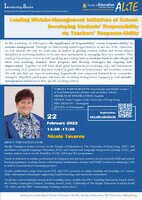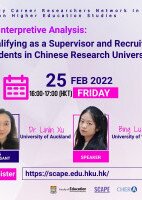Citizenship and Higher Education: Rethinking Access in the Longue Durée
Seminar , Webinar
Date
2022-02-10
Time
4:30 PM - 5:45 PM

Ideas, Debates, and More: Meeting of European and Asian Higher Education Researchers
Topic: Citizenship and Higher Education: Rethinking Access in the Longue Durée
Co-organizers: Social Contexts and Policies of Education (Academic Unit) (SCAPE), Consortium for Higher Education Research in Asia (CHERA)
Date: February 10, 2022 (Thursday)(HK Time)
Time: 16:30-17:45
Format: Zoom
Registration: https://scape.edu.hku.hk/feb1022/
Chair: Dr Hugo Horta, The University of Hong Kong
Speaker: Prof Gaële Goastellec, University of Lausanne, Switzerlan
Abstract
A large body of research on higher education questions the social characteristics of students and the determinants of access. Sociologists and historians alike have documented differential access according to social, economic, ethnic or geographical background, as well as gender (Bourdieu & Passeron, 1964, 1970; Boudon, 1973; Anderson, 2004; Arum et al, 2007; Julia & Revel, 1989, etc.). However, little research questions the relationship between higher education and citizenship, and when it does, it is mainly on how higher education could contribute to citizenship education (Zgaga, 2009; Horey et al, 2018; Cheng & Holton, 2018; Fernandez, 2005, etc.). How citizenship affects access opportunities and vice versa has been little discussed, although, as we will show using a European perspective, it represents a historical and widely shared driver of access organisation.
The concept of citizenship, understood in a broad sense, defines what binds an individual, his rights and duties, to a political territory. It is disconnected from the type of political regime in place: citizenship ‘can exist without democracy: (…) the rights and duties associated with the status of citizen can be decided and attributed by those who govern (…)’ (Bickel, 2007: 12).
Therefore, ‘not all regimes of rights and citizenship are similar and not all are national’ (Burbank & Cooper, 2008), and citizenship is not only associated with modern states (Magnette, 2001). Therefore, the concept of citizenship comprises ‘multiple meanings (…)’ (Bickel, 2007, pp. 12-14), ‘concentrates a complex stratification of multiple meanings going back to different historical periods’ (Koselleck, 1979/1990, p. 109) and is variously associated with different social affiliations over time.
What can we learn by interrogating access to university through the lens of citizenship? We argue that the instrumentation of access relies on a grammar of citizenship that is both linked to social stratification and to the framing of geographical circulations.
In order to document this, based on a socio-historical work on the history of access to universities in Europe (Goastellec, 2020), this presentation will recall how the rights and duties of university members were the very first issue of negotiations between the university and the authority. A second part will document the dynamics that circumscribe the categories of citizens with access rights and the reciprocal effect of studies on access to citizenship. A third part will focus on the interactions between student circulation and political citizenship. Finally, in the fourth part we will contrast the diffusion of a so-called universal citizenship with the permanence of a differentiation of citizenship. The conclusion, based on a synthesis of the identified processes, will problematise how such research offers the opportunity to adopt a ‘relational stance’: by identifying the connections between the different territories and scales articulated in the instruments of access, we will highlight the contribution of the articulation of access and citizenship to the global historical development (Go & Lawson, 2017).
Bio
Gaële Goastellec is a sociologist. Her main research interests lie in the relationship between education and social organizations, analyzed through the socio-historical comparison of higher education systems and institutions. A first stream of research deals with access to Higher Education (from Middle Ages to Contemporary Europe and on a global scale for the 20th century), with a special concern for social belongings’ categorization and its translation into admission policies. Her most recent research focus on exiles opportunities to access HE depending on national administrative categorizations of refugees. A second line of research analyzes academic careers (also through international comparisons) and HE organizations.
Professor (MER) at the University of Lausanne, Switzerland, she is the director of the Observatory Science, Policy and Society (OSPS). Current vice-President of the AISLF research committee on International Comparisons, elected member of the Academia Europaea, she has previously been a Lavoisier Fellow (2004-2005) and a Fulbright New Century Scholar fellow (2005-2006).
Follow us: https://twitter.com/HkuScape



